HSO4004 Principles of Care: Legislation, Theories, and Risk Assessment
VerifiedAdded on 2023/06/08
|8
|2497
|444
Report
AI Summary
This report provides an overview of the principles of care within health and social care practice, emphasizing their importance in providing efficient and ethical care to vulnerable individuals. It explores key principles such as privacy, dignity, independence, equality, and human rights, linking them to Maslow's Hierarchy of Needs and Roger's Humanistic Theory. The report also discusses the impact of key legislations like the Health and Social Care Act, Equality Act 2010, and the Care Act 2014, along with relevant policies and codes of conduct. It evaluates how the rights and autonomy of vulnerable people are protected and balanced to prevent harm and abuse, highlighting the significance of risk assessment and anti-discriminatory practices as per the Equality Act 2010, reinforcing the need for a safe and equitable healthcare environment.
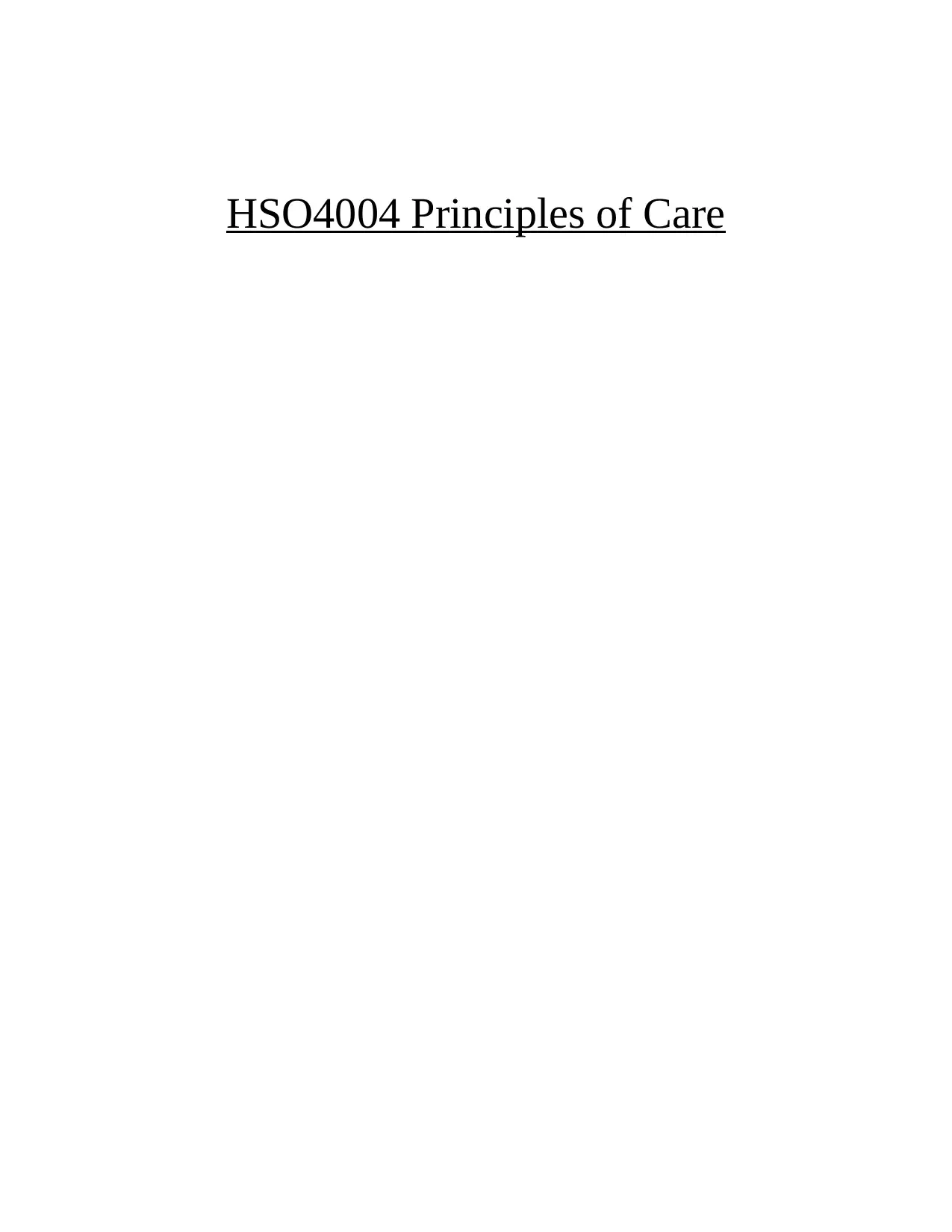
HSO4004 Principles of Care
Paraphrase This Document
Need a fresh take? Get an instant paraphrase of this document with our AI Paraphraser

Table of Content.
INTRODUCTION...........................................................................................................................1
MAIN BODY...................................................................................................................................1
CONCLUSION................................................................................................................................1
REFERENCES................................................................................................................................2
INTRODUCTION...........................................................................................................................1
MAIN BODY...................................................................................................................................1
CONCLUSION................................................................................................................................1
REFERENCES................................................................................................................................2
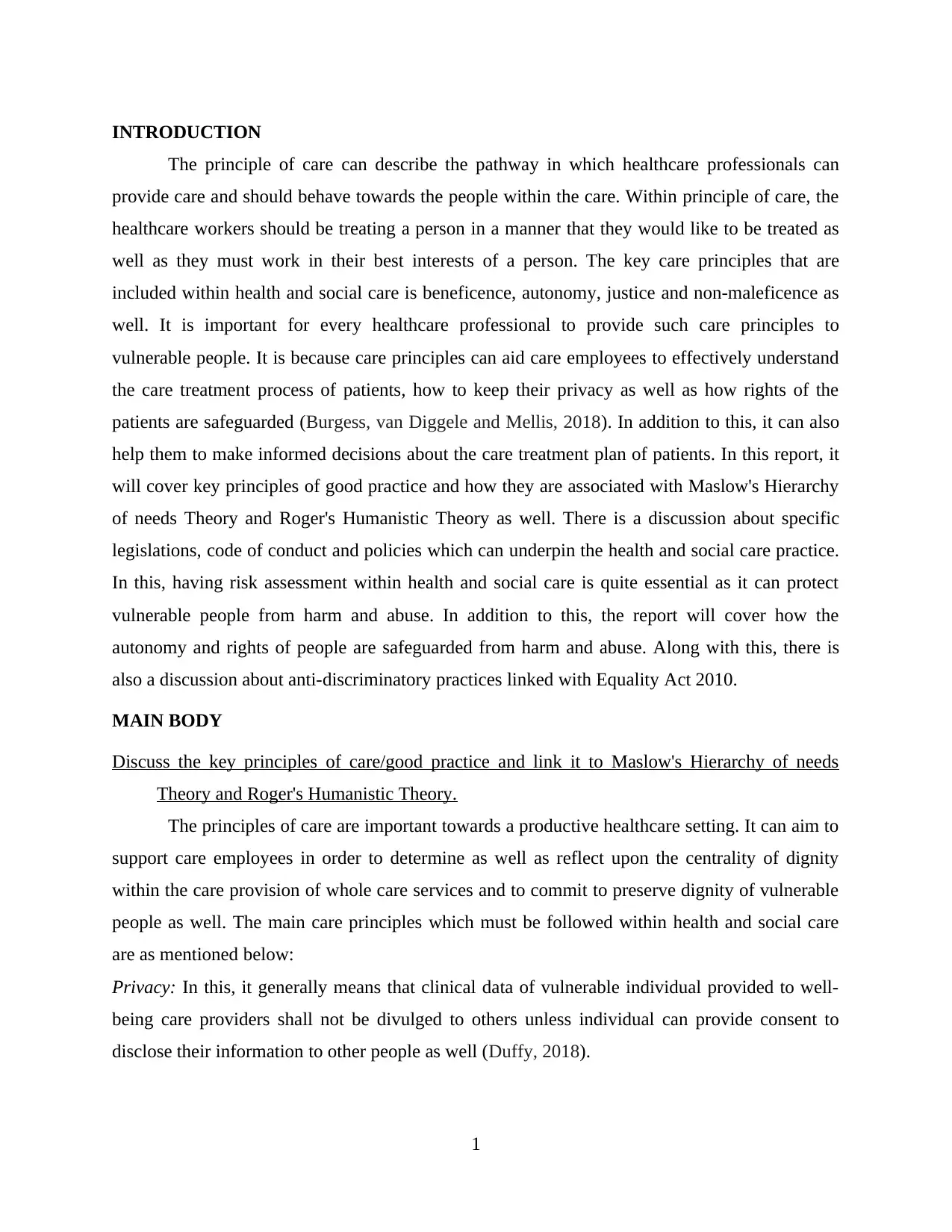
INTRODUCTION
The principle of care can describe the pathway in which healthcare professionals can
provide care and should behave towards the people within the care. Within principle of care, the
healthcare workers should be treating a person in a manner that they would like to be treated as
well as they must work in their best interests of a person. The key care principles that are
included within health and social care is beneficence, autonomy, justice and non-maleficence as
well. It is important for every healthcare professional to provide such care principles to
vulnerable people. It is because care principles can aid care employees to effectively understand
the care treatment process of patients, how to keep their privacy as well as how rights of the
patients are safeguarded (Burgess, van Diggele and Mellis, 2018). In addition to this, it can also
help them to make informed decisions about the care treatment plan of patients. In this report, it
will cover key principles of good practice and how they are associated with Maslow's Hierarchy
of needs Theory and Roger's Humanistic Theory as well. There is a discussion about specific
legislations, code of conduct and policies which can underpin the health and social care practice.
In this, having risk assessment within health and social care is quite essential as it can protect
vulnerable people from harm and abuse. In addition to this, the report will cover how the
autonomy and rights of people are safeguarded from harm and abuse. Along with this, there is
also a discussion about anti-discriminatory practices linked with Equality Act 2010.
MAIN BODY
Discuss the key principles of care/good practice and link it to Maslow's Hierarchy of needs
Theory and Roger's Humanistic Theory.
The principles of care are important towards a productive healthcare setting. It can aim to
support care employees in order to determine as well as reflect upon the centrality of dignity
within the care provision of whole care services and to commit to preserve dignity of vulnerable
people as well. The main care principles which must be followed within health and social care
are as mentioned below:
Privacy: In this, it generally means that clinical data of vulnerable individual provided to well-
being care providers shall not be divulged to others unless individual can provide consent to
disclose their information to other people as well (Duffy, 2018).
1
The principle of care can describe the pathway in which healthcare professionals can
provide care and should behave towards the people within the care. Within principle of care, the
healthcare workers should be treating a person in a manner that they would like to be treated as
well as they must work in their best interests of a person. The key care principles that are
included within health and social care is beneficence, autonomy, justice and non-maleficence as
well. It is important for every healthcare professional to provide such care principles to
vulnerable people. It is because care principles can aid care employees to effectively understand
the care treatment process of patients, how to keep their privacy as well as how rights of the
patients are safeguarded (Burgess, van Diggele and Mellis, 2018). In addition to this, it can also
help them to make informed decisions about the care treatment plan of patients. In this report, it
will cover key principles of good practice and how they are associated with Maslow's Hierarchy
of needs Theory and Roger's Humanistic Theory as well. There is a discussion about specific
legislations, code of conduct and policies which can underpin the health and social care practice.
In this, having risk assessment within health and social care is quite essential as it can protect
vulnerable people from harm and abuse. In addition to this, the report will cover how the
autonomy and rights of people are safeguarded from harm and abuse. Along with this, there is
also a discussion about anti-discriminatory practices linked with Equality Act 2010.
MAIN BODY
Discuss the key principles of care/good practice and link it to Maslow's Hierarchy of needs
Theory and Roger's Humanistic Theory.
The principles of care are important towards a productive healthcare setting. It can aim to
support care employees in order to determine as well as reflect upon the centrality of dignity
within the care provision of whole care services and to commit to preserve dignity of vulnerable
people as well. The main care principles which must be followed within health and social care
are as mentioned below:
Privacy: In this, it generally means that clinical data of vulnerable individual provided to well-
being care providers shall not be divulged to others unless individual can provide consent to
disclose their information to other people as well (Duffy, 2018).
1
⊘ This is a preview!⊘
Do you want full access?
Subscribe today to unlock all pages.

Trusted by 1+ million students worldwide
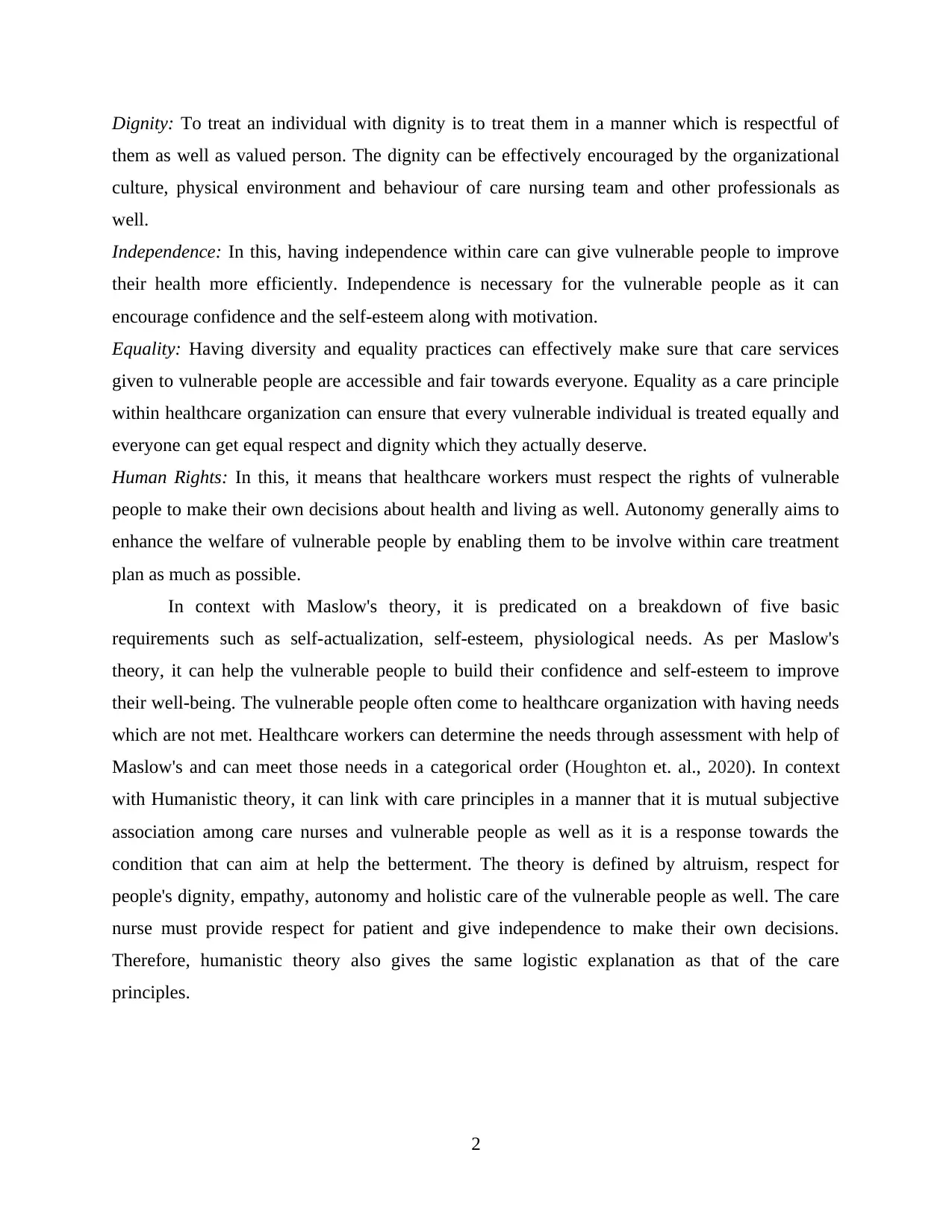
Dignity: To treat an individual with dignity is to treat them in a manner which is respectful of
them as well as valued person. The dignity can be effectively encouraged by the organizational
culture, physical environment and behaviour of care nursing team and other professionals as
well.
Independence: In this, having independence within care can give vulnerable people to improve
their health more efficiently. Independence is necessary for the vulnerable people as it can
encourage confidence and the self-esteem along with motivation.
Equality: Having diversity and equality practices can effectively make sure that care services
given to vulnerable people are accessible and fair towards everyone. Equality as a care principle
within healthcare organization can ensure that every vulnerable individual is treated equally and
everyone can get equal respect and dignity which they actually deserve.
Human Rights: In this, it means that healthcare workers must respect the rights of vulnerable
people to make their own decisions about health and living as well. Autonomy generally aims to
enhance the welfare of vulnerable people by enabling them to be involve within care treatment
plan as much as possible.
In context with Maslow's theory, it is predicated on a breakdown of five basic
requirements such as self-actualization, self-esteem, physiological needs. As per Maslow's
theory, it can help the vulnerable people to build their confidence and self-esteem to improve
their well-being. The vulnerable people often come to healthcare organization with having needs
which are not met. Healthcare workers can determine the needs through assessment with help of
Maslow's and can meet those needs in a categorical order (Houghton et. al., 2020). In context
with Humanistic theory, it can link with care principles in a manner that it is mutual subjective
association among care nurses and vulnerable people as well as it is a response towards the
condition that can aim at help the betterment. The theory is defined by altruism, respect for
people's dignity, empathy, autonomy and holistic care of the vulnerable people as well. The care
nurse must provide respect for patient and give independence to make their own decisions.
Therefore, humanistic theory also gives the same logistic explanation as that of the care
principles.
2
them as well as valued person. The dignity can be effectively encouraged by the organizational
culture, physical environment and behaviour of care nursing team and other professionals as
well.
Independence: In this, having independence within care can give vulnerable people to improve
their health more efficiently. Independence is necessary for the vulnerable people as it can
encourage confidence and the self-esteem along with motivation.
Equality: Having diversity and equality practices can effectively make sure that care services
given to vulnerable people are accessible and fair towards everyone. Equality as a care principle
within healthcare organization can ensure that every vulnerable individual is treated equally and
everyone can get equal respect and dignity which they actually deserve.
Human Rights: In this, it means that healthcare workers must respect the rights of vulnerable
people to make their own decisions about health and living as well. Autonomy generally aims to
enhance the welfare of vulnerable people by enabling them to be involve within care treatment
plan as much as possible.
In context with Maslow's theory, it is predicated on a breakdown of five basic
requirements such as self-actualization, self-esteem, physiological needs. As per Maslow's
theory, it can help the vulnerable people to build their confidence and self-esteem to improve
their well-being. The vulnerable people often come to healthcare organization with having needs
which are not met. Healthcare workers can determine the needs through assessment with help of
Maslow's and can meet those needs in a categorical order (Houghton et. al., 2020). In context
with Humanistic theory, it can link with care principles in a manner that it is mutual subjective
association among care nurses and vulnerable people as well as it is a response towards the
condition that can aim at help the betterment. The theory is defined by altruism, respect for
people's dignity, empathy, autonomy and holistic care of the vulnerable people as well. The care
nurse must provide respect for patient and give independence to make their own decisions.
Therefore, humanistic theory also gives the same logistic explanation as that of the care
principles.
2
Paraphrase This Document
Need a fresh take? Get an instant paraphrase of this document with our AI Paraphraser
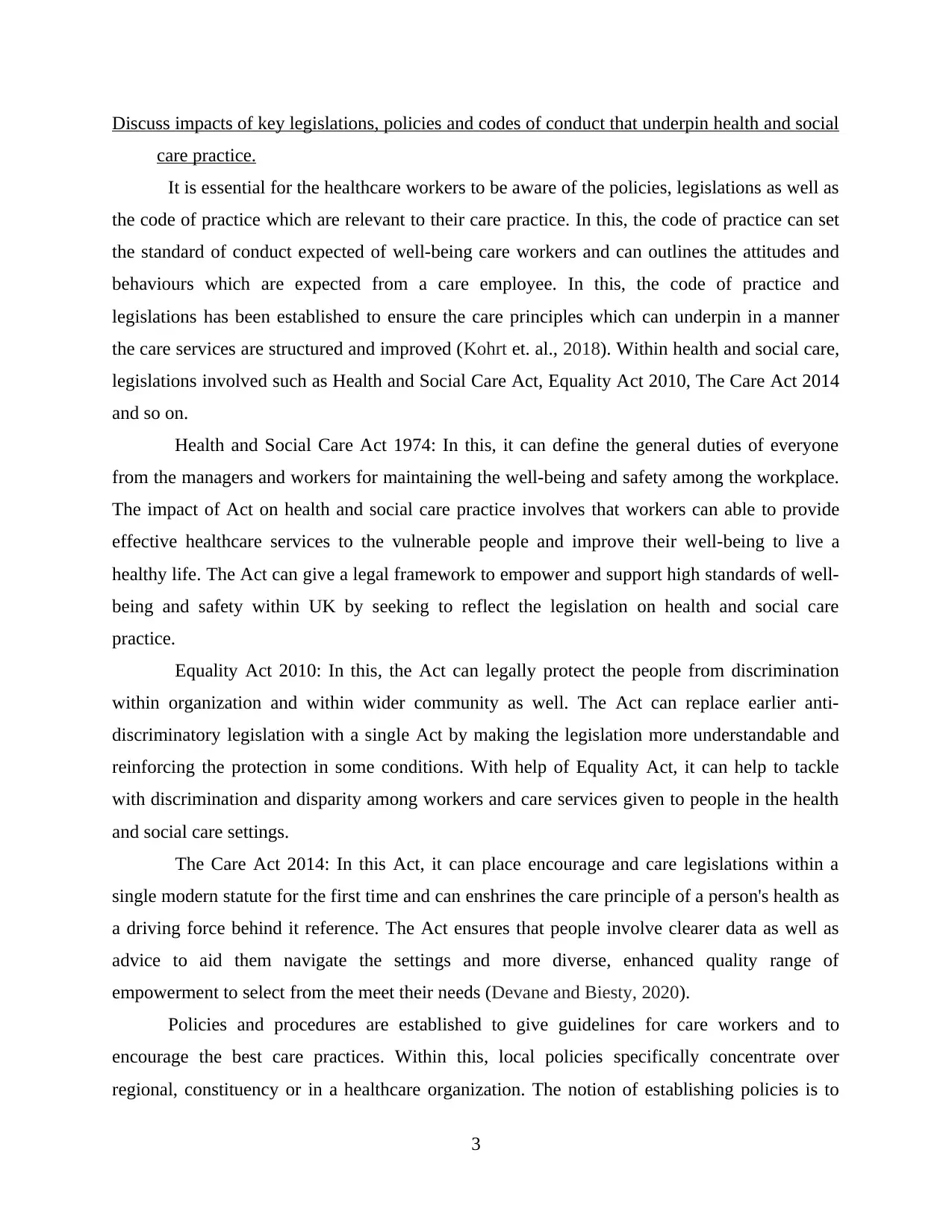
Discuss impacts of key legislations, policies and codes of conduct that underpin health and social
care practice.
It is essential for the healthcare workers to be aware of the policies, legislations as well as
the code of practice which are relevant to their care practice. In this, the code of practice can set
the standard of conduct expected of well-being care workers and can outlines the attitudes and
behaviours which are expected from a care employee. In this, the code of practice and
legislations has been established to ensure the care principles which can underpin in a manner
the care services are structured and improved (Kohrt et. al., 2018). Within health and social care,
legislations involved such as Health and Social Care Act, Equality Act 2010, The Care Act 2014
and so on.
Health and Social Care Act 1974: In this, it can define the general duties of everyone
from the managers and workers for maintaining the well-being and safety among the workplace.
The impact of Act on health and social care practice involves that workers can able to provide
effective healthcare services to the vulnerable people and improve their well-being to live a
healthy life. The Act can give a legal framework to empower and support high standards of well-
being and safety within UK by seeking to reflect the legislation on health and social care
practice.
Equality Act 2010: In this, the Act can legally protect the people from discrimination
within organization and within wider community as well. The Act can replace earlier anti-
discriminatory legislation with a single Act by making the legislation more understandable and
reinforcing the protection in some conditions. With help of Equality Act, it can help to tackle
with discrimination and disparity among workers and care services given to people in the health
and social care settings.
The Care Act 2014: In this Act, it can place encourage and care legislations within a
single modern statute for the first time and can enshrines the care principle of a person's health as
a driving force behind it reference. The Act ensures that people involve clearer data as well as
advice to aid them navigate the settings and more diverse, enhanced quality range of
empowerment to select from the meet their needs (Devane and Biesty, 2020).
Policies and procedures are established to give guidelines for care workers and to
encourage the best care practices. Within this, local policies specifically concentrate over
regional, constituency or in a healthcare organization. The notion of establishing policies is to
3
care practice.
It is essential for the healthcare workers to be aware of the policies, legislations as well as
the code of practice which are relevant to their care practice. In this, the code of practice can set
the standard of conduct expected of well-being care workers and can outlines the attitudes and
behaviours which are expected from a care employee. In this, the code of practice and
legislations has been established to ensure the care principles which can underpin in a manner
the care services are structured and improved (Kohrt et. al., 2018). Within health and social care,
legislations involved such as Health and Social Care Act, Equality Act 2010, The Care Act 2014
and so on.
Health and Social Care Act 1974: In this, it can define the general duties of everyone
from the managers and workers for maintaining the well-being and safety among the workplace.
The impact of Act on health and social care practice involves that workers can able to provide
effective healthcare services to the vulnerable people and improve their well-being to live a
healthy life. The Act can give a legal framework to empower and support high standards of well-
being and safety within UK by seeking to reflect the legislation on health and social care
practice.
Equality Act 2010: In this, the Act can legally protect the people from discrimination
within organization and within wider community as well. The Act can replace earlier anti-
discriminatory legislation with a single Act by making the legislation more understandable and
reinforcing the protection in some conditions. With help of Equality Act, it can help to tackle
with discrimination and disparity among workers and care services given to people in the health
and social care settings.
The Care Act 2014: In this Act, it can place encourage and care legislations within a
single modern statute for the first time and can enshrines the care principle of a person's health as
a driving force behind it reference. The Act ensures that people involve clearer data as well as
advice to aid them navigate the settings and more diverse, enhanced quality range of
empowerment to select from the meet their needs (Devane and Biesty, 2020).
Policies and procedures are established to give guidelines for care workers and to
encourage the best care practices. Within this, local policies specifically concentrate over
regional, constituency or in a healthcare organization. The notion of establishing policies is to
3
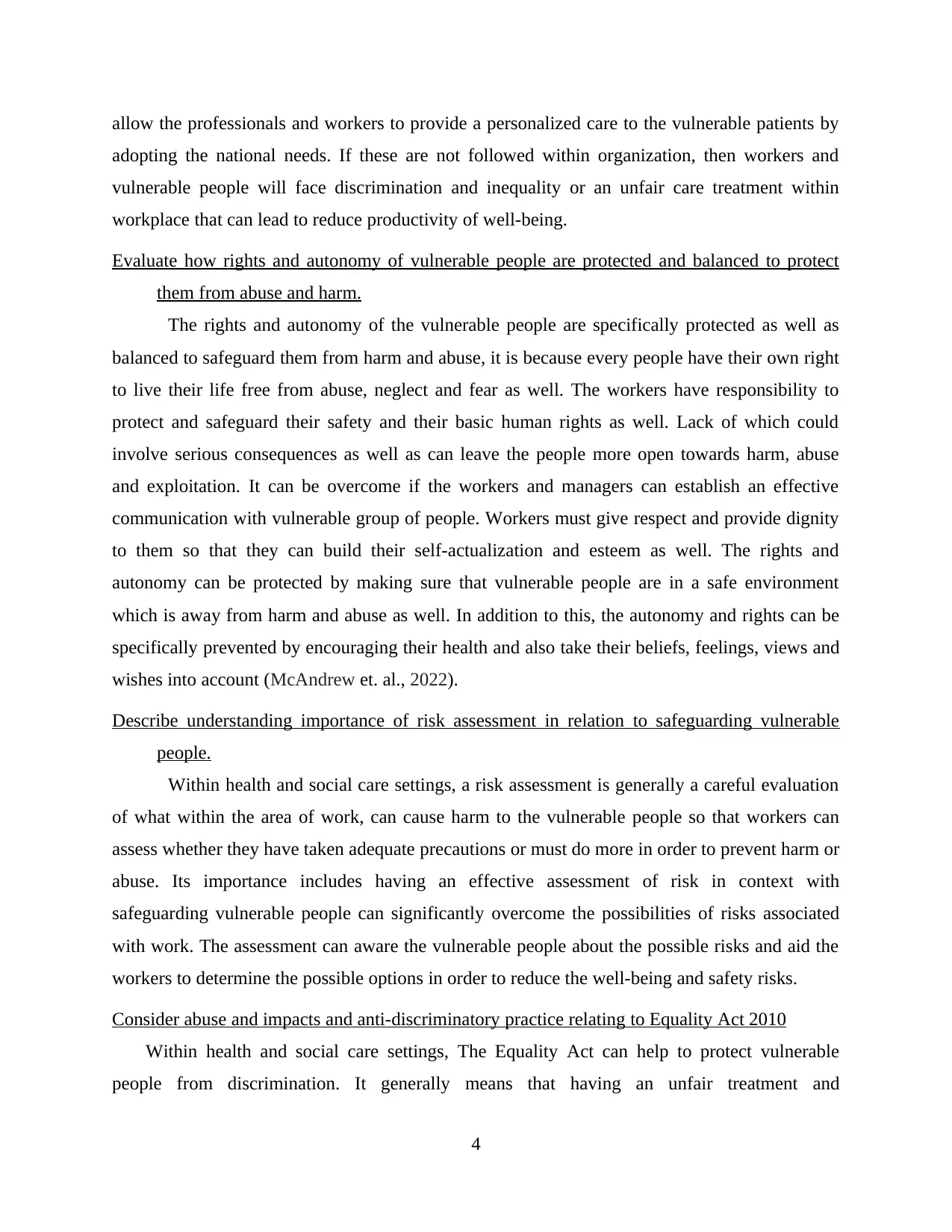
allow the professionals and workers to provide a personalized care to the vulnerable patients by
adopting the national needs. If these are not followed within organization, then workers and
vulnerable people will face discrimination and inequality or an unfair care treatment within
workplace that can lead to reduce productivity of well-being.
Evaluate how rights and autonomy of vulnerable people are protected and balanced to protect
them from abuse and harm.
The rights and autonomy of the vulnerable people are specifically protected as well as
balanced to safeguard them from harm and abuse, it is because every people have their own right
to live their life free from abuse, neglect and fear as well. The workers have responsibility to
protect and safeguard their safety and their basic human rights as well. Lack of which could
involve serious consequences as well as can leave the people more open towards harm, abuse
and exploitation. It can be overcome if the workers and managers can establish an effective
communication with vulnerable group of people. Workers must give respect and provide dignity
to them so that they can build their self-actualization and esteem as well. The rights and
autonomy can be protected by making sure that vulnerable people are in a safe environment
which is away from harm and abuse as well. In addition to this, the autonomy and rights can be
specifically prevented by encouraging their health and also take their beliefs, feelings, views and
wishes into account (McAndrew et. al., 2022).
Describe understanding importance of risk assessment in relation to safeguarding vulnerable
people.
Within health and social care settings, a risk assessment is generally a careful evaluation
of what within the area of work, can cause harm to the vulnerable people so that workers can
assess whether they have taken adequate precautions or must do more in order to prevent harm or
abuse. Its importance includes having an effective assessment of risk in context with
safeguarding vulnerable people can significantly overcome the possibilities of risks associated
with work. The assessment can aware the vulnerable people about the possible risks and aid the
workers to determine the possible options in order to reduce the well-being and safety risks.
Consider abuse and impacts and anti-discriminatory practice relating to Equality Act 2010
Within health and social care settings, The Equality Act can help to protect vulnerable
people from discrimination. It generally means that having an unfair treatment and
4
adopting the national needs. If these are not followed within organization, then workers and
vulnerable people will face discrimination and inequality or an unfair care treatment within
workplace that can lead to reduce productivity of well-being.
Evaluate how rights and autonomy of vulnerable people are protected and balanced to protect
them from abuse and harm.
The rights and autonomy of the vulnerable people are specifically protected as well as
balanced to safeguard them from harm and abuse, it is because every people have their own right
to live their life free from abuse, neglect and fear as well. The workers have responsibility to
protect and safeguard their safety and their basic human rights as well. Lack of which could
involve serious consequences as well as can leave the people more open towards harm, abuse
and exploitation. It can be overcome if the workers and managers can establish an effective
communication with vulnerable group of people. Workers must give respect and provide dignity
to them so that they can build their self-actualization and esteem as well. The rights and
autonomy can be protected by making sure that vulnerable people are in a safe environment
which is away from harm and abuse as well. In addition to this, the autonomy and rights can be
specifically prevented by encouraging their health and also take their beliefs, feelings, views and
wishes into account (McAndrew et. al., 2022).
Describe understanding importance of risk assessment in relation to safeguarding vulnerable
people.
Within health and social care settings, a risk assessment is generally a careful evaluation
of what within the area of work, can cause harm to the vulnerable people so that workers can
assess whether they have taken adequate precautions or must do more in order to prevent harm or
abuse. Its importance includes having an effective assessment of risk in context with
safeguarding vulnerable people can significantly overcome the possibilities of risks associated
with work. The assessment can aware the vulnerable people about the possible risks and aid the
workers to determine the possible options in order to reduce the well-being and safety risks.
Consider abuse and impacts and anti-discriminatory practice relating to Equality Act 2010
Within health and social care settings, The Equality Act can help to protect vulnerable
people from discrimination. It generally means that having an unfair treatment and
4
⊘ This is a preview!⊘
Do you want full access?
Subscribe today to unlock all pages.

Trusted by 1+ million students worldwide
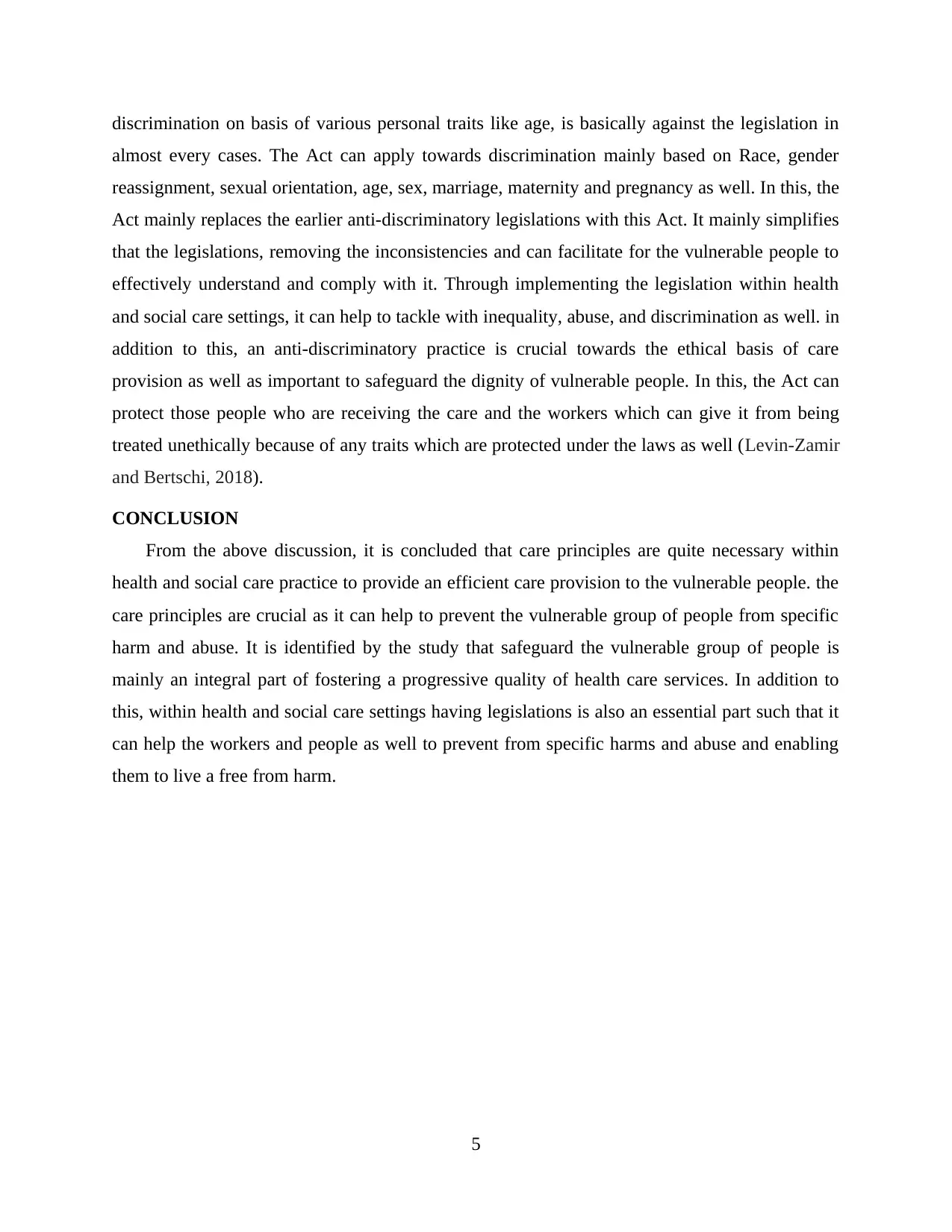
discrimination on basis of various personal traits like age, is basically against the legislation in
almost every cases. The Act can apply towards discrimination mainly based on Race, gender
reassignment, sexual orientation, age, sex, marriage, maternity and pregnancy as well. In this, the
Act mainly replaces the earlier anti-discriminatory legislations with this Act. It mainly simplifies
that the legislations, removing the inconsistencies and can facilitate for the vulnerable people to
effectively understand and comply with it. Through implementing the legislation within health
and social care settings, it can help to tackle with inequality, abuse, and discrimination as well. in
addition to this, an anti-discriminatory practice is crucial towards the ethical basis of care
provision as well as important to safeguard the dignity of vulnerable people. In this, the Act can
protect those people who are receiving the care and the workers which can give it from being
treated unethically because of any traits which are protected under the laws as well (Levin-Zamir
and Bertschi, 2018).
CONCLUSION
From the above discussion, it is concluded that care principles are quite necessary within
health and social care practice to provide an efficient care provision to the vulnerable people. the
care principles are crucial as it can help to prevent the vulnerable group of people from specific
harm and abuse. It is identified by the study that safeguard the vulnerable group of people is
mainly an integral part of fostering a progressive quality of health care services. In addition to
this, within health and social care settings having legislations is also an essential part such that it
can help the workers and people as well to prevent from specific harms and abuse and enabling
them to live a free from harm.
5
almost every cases. The Act can apply towards discrimination mainly based on Race, gender
reassignment, sexual orientation, age, sex, marriage, maternity and pregnancy as well. In this, the
Act mainly replaces the earlier anti-discriminatory legislations with this Act. It mainly simplifies
that the legislations, removing the inconsistencies and can facilitate for the vulnerable people to
effectively understand and comply with it. Through implementing the legislation within health
and social care settings, it can help to tackle with inequality, abuse, and discrimination as well. in
addition to this, an anti-discriminatory practice is crucial towards the ethical basis of care
provision as well as important to safeguard the dignity of vulnerable people. In this, the Act can
protect those people who are receiving the care and the workers which can give it from being
treated unethically because of any traits which are protected under the laws as well (Levin-Zamir
and Bertschi, 2018).
CONCLUSION
From the above discussion, it is concluded that care principles are quite necessary within
health and social care practice to provide an efficient care provision to the vulnerable people. the
care principles are crucial as it can help to prevent the vulnerable group of people from specific
harm and abuse. It is identified by the study that safeguard the vulnerable group of people is
mainly an integral part of fostering a progressive quality of health care services. In addition to
this, within health and social care settings having legislations is also an essential part such that it
can help the workers and people as well to prevent from specific harms and abuse and enabling
them to live a free from harm.
5
Paraphrase This Document
Need a fresh take? Get an instant paraphrase of this document with our AI Paraphraser
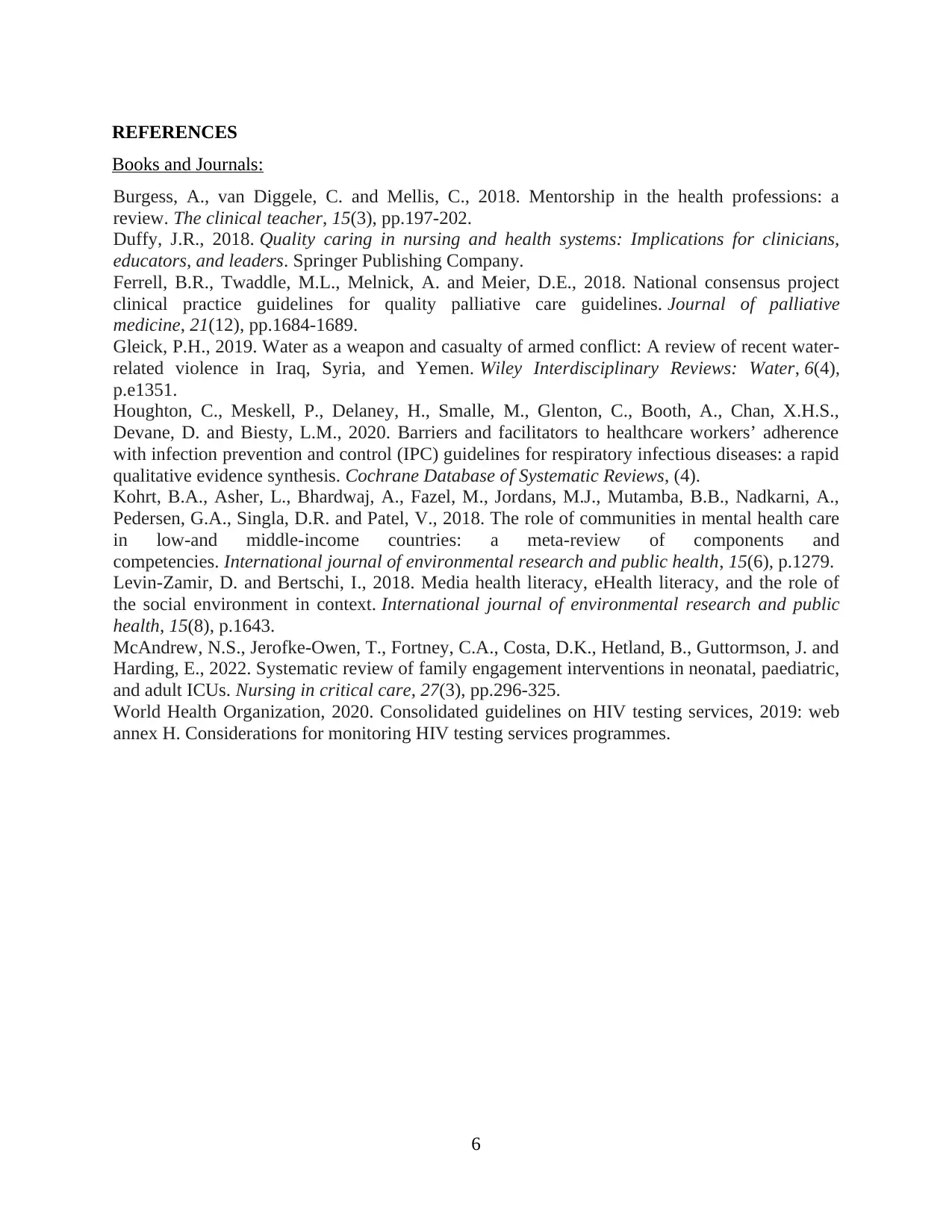
REFERENCES
Books and Journals:
Burgess, A., van Diggele, C. and Mellis, C., 2018. Mentorship in the health professions: a
review. The clinical teacher, 15(3), pp.197-202.
Duffy, J.R., 2018. Quality caring in nursing and health systems: Implications for clinicians,
educators, and leaders. Springer Publishing Company.
Ferrell, B.R., Twaddle, M.L., Melnick, A. and Meier, D.E., 2018. National consensus project
clinical practice guidelines for quality palliative care guidelines. Journal of palliative
medicine, 21(12), pp.1684-1689.
Gleick, P.H., 2019. Water as a weapon and casualty of armed conflict: A review of recent water‐
related violence in Iraq, Syria, and Yemen. Wiley Interdisciplinary Reviews: Water, 6(4),
p.e1351.
Houghton, C., Meskell, P., Delaney, H., Smalle, M., Glenton, C., Booth, A., Chan, X.H.S.,
Devane, D. and Biesty, L.M., 2020. Barriers and facilitators to healthcare workers’ adherence
with infection prevention and control (IPC) guidelines for respiratory infectious diseases: a rapid
qualitative evidence synthesis. Cochrane Database of Systematic Reviews, (4).
Kohrt, B.A., Asher, L., Bhardwaj, A., Fazel, M., Jordans, M.J., Mutamba, B.B., Nadkarni, A.,
Pedersen, G.A., Singla, D.R. and Patel, V., 2018. The role of communities in mental health care
in low-and middle-income countries: a meta-review of components and
competencies. International journal of environmental research and public health, 15(6), p.1279.
Levin-Zamir, D. and Bertschi, I., 2018. Media health literacy, eHealth literacy, and the role of
the social environment in context. International journal of environmental research and public
health, 15(8), p.1643.
McAndrew, N.S., Jerofke‐Owen, T., Fortney, C.A., Costa, D.K., Hetland, B., Guttormson, J. and
Harding, E., 2022. Systematic review of family engagement interventions in neonatal, paediatric,
and adult ICUs. Nursing in critical care, 27(3), pp.296-325.
World Health Organization, 2020. Consolidated guidelines on HIV testing services, 2019: web
annex H. Considerations for monitoring HIV testing services programmes.
6
Books and Journals:
Burgess, A., van Diggele, C. and Mellis, C., 2018. Mentorship in the health professions: a
review. The clinical teacher, 15(3), pp.197-202.
Duffy, J.R., 2018. Quality caring in nursing and health systems: Implications for clinicians,
educators, and leaders. Springer Publishing Company.
Ferrell, B.R., Twaddle, M.L., Melnick, A. and Meier, D.E., 2018. National consensus project
clinical practice guidelines for quality palliative care guidelines. Journal of palliative
medicine, 21(12), pp.1684-1689.
Gleick, P.H., 2019. Water as a weapon and casualty of armed conflict: A review of recent water‐
related violence in Iraq, Syria, and Yemen. Wiley Interdisciplinary Reviews: Water, 6(4),
p.e1351.
Houghton, C., Meskell, P., Delaney, H., Smalle, M., Glenton, C., Booth, A., Chan, X.H.S.,
Devane, D. and Biesty, L.M., 2020. Barriers and facilitators to healthcare workers’ adherence
with infection prevention and control (IPC) guidelines for respiratory infectious diseases: a rapid
qualitative evidence synthesis. Cochrane Database of Systematic Reviews, (4).
Kohrt, B.A., Asher, L., Bhardwaj, A., Fazel, M., Jordans, M.J., Mutamba, B.B., Nadkarni, A.,
Pedersen, G.A., Singla, D.R. and Patel, V., 2018. The role of communities in mental health care
in low-and middle-income countries: a meta-review of components and
competencies. International journal of environmental research and public health, 15(6), p.1279.
Levin-Zamir, D. and Bertschi, I., 2018. Media health literacy, eHealth literacy, and the role of
the social environment in context. International journal of environmental research and public
health, 15(8), p.1643.
McAndrew, N.S., Jerofke‐Owen, T., Fortney, C.A., Costa, D.K., Hetland, B., Guttormson, J. and
Harding, E., 2022. Systematic review of family engagement interventions in neonatal, paediatric,
and adult ICUs. Nursing in critical care, 27(3), pp.296-325.
World Health Organization, 2020. Consolidated guidelines on HIV testing services, 2019: web
annex H. Considerations for monitoring HIV testing services programmes.
6
1 out of 8
Related Documents
Your All-in-One AI-Powered Toolkit for Academic Success.
+13062052269
info@desklib.com
Available 24*7 on WhatsApp / Email
![[object Object]](/_next/static/media/star-bottom.7253800d.svg)
Unlock your academic potential
Copyright © 2020–2026 A2Z Services. All Rights Reserved. Developed and managed by ZUCOL.


